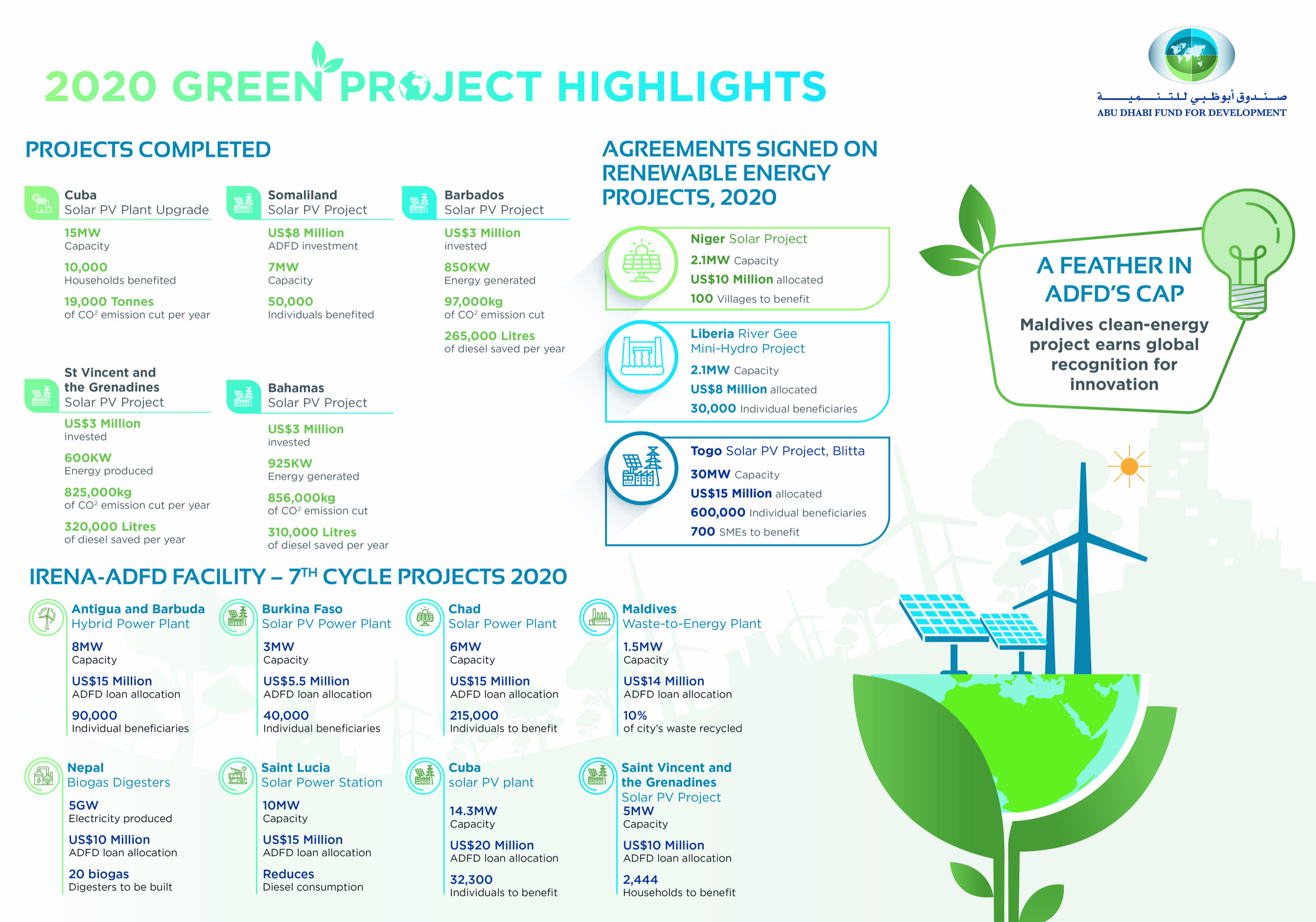Abu Dhabi Fund for Development, one of the UAE’s leading financial entities, continued to advance its sustainable development agenda within the country and abroad through clean-energy initiatives.
Notwithstanding challenges of the Covid-19 pandemic, the Fund completed five crucial renewable energy projects in five partner countries, including Cuba, Somaliland, the Bahamas, Barbados, and Saint Vincent and the Grenadines. The projects worth AED117.3 million not just enabled the countries to reduce their carbon footprint by infusing a total of 14.38MW into the energy mix, but they also brought about a host of economic benefits.
According to HE Mohammed Saif Al Suwaidi, Director General of ADFD, these projects highlighted the Fund’s strong commitment towards fostering socioeconomic growth in the developing world through sustainable initiatives.
“We doubled our effort to ensure that we delivered the projects to our partner countries, especially during such a time of crisis. The aim was to help them maintain their economic and social-development trajectories by enabling them to meet developmental challenges during the pandemic. These projects also underscored the Fund’s preparedness and ability to deal with any difficulties,” he said.
“Renewable projects remain high on our agenda as their impact is felt on multiple levels, from commerce to the environment. Moreover, the turbulence in 2020 forced us to focus on what really matters, while it made all of us realise the value of partnership and cooperation.”
In January of last year, the Fund announced an allocation of approximately AED384 million (US$104.5 million) to eight renewable-energy initiatives under the seventh cycle of its partnership with the International Renewable Energy Agency (IRENA). Not to mention that it signed three loan agreements worth AED121 million (US$33 million) with the West African nations of Togo, Niger and Liberia. In July, it financed a waste-to-energy project in the Maldives, which earned a certification from Global Innovation Institute (GINI), a leading international professional certification, accreditation and membership association in the field of innovation.
Under the facility, eight projects were to be funded in Antigua and Barbuda, Burkina Faso, Chad, Cuba, the Maldives, Nepal, Saint Lucia and Saint Vincent and the Grenadines. The announcement brought cumulative funding to AED1.28 billion (US$350 million), in line with the commitment made by ADFD across seven funding cycles to IRENA recommended projects.
The Fund also delivers its impact through the AED183.65 million (US$50 million) UAE-Caribbean Renewable Energy Fund (UAE-CREF) that it finances with an aim to deliver renewable energy projects across 16 Caribbean Island nations to help reduce reliance on fossil-fuel imports, increase energy access and enhance climate change resilience. Launched in 2017, the UAE-CREF is the largest renewable energy initiative of its kind in the Caribbean region.
Such a portfolio also comes with a good deal of responsibility that the Fund meet even in the most turbulent time. The year 2020 therefore saw the completion of five of its promised projects that raised the share of renewable energy by 14.38MW in the energy mix. Implemented at a total cost of AED 117.3 million, these projects supported socioeconomic development in beneficiary countries at a critical time. Below is an overview of the projects completed last year:
Solar power project, Somaliland
Set up at a cost of AED29.3 million, the 7-megawatt project is seen as a gamechanger for Berbera City, as it will significantly bring down energy tariffs, apart from supporting economic development and reducing the country’s carbon footprint.
Solar PV plant, Cuba
The 10-megawatt solar photovoltaic plant in Cuba that became operational in 2019 received a capacity boost to 15MW. The grid-connected project financed by ADFD meets the needs of an estimated 10,000 households.
Solar project, Bahamas
An AED11 million solar project at a stadium car park is expected to save the public purse thousands of dollars in power generation. The project financed from the UAE-CREF scheme is part of a larger initiative to support the energy infrastructure of the Caribbean nations and enhance their share of renewable energy.The solar PV project has helped the island nation to save 310,000 litres of diesel per year, as well as reduce CO2 emission by 856,000kg.
Solar PV project, Barbados
Financed under the UAE-CREF initiative, the AED 11 million project included installation of solar PV panels in car parks for car-battery charging, as well as at the Barbados Water Authority. The project has led to reduction of CO2 emission by 975,000kg per year and savings on 265,000 litres of fossil fuel. Not to mention that it has generated significant job opportunities for women.
Solar PV project, St Vincent and the Grenadines
An 600kW photovoltaic solar power plant on Union Island has reduced production cost, cut annual CO2 emission by 825,000kg and expenses on 320,000 litres of diesel. The AED11 million project, financed under the UAE-CREF initiative, has also created jobs, especially for women. With the project, the country raised its share of renewable energy to 35 per cent.







